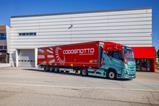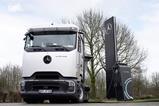Daimler Truck has completed winter trials of its next-generation Mercedes-Benz GenH2 fuel cell trucks, deploying two liquid hydrogen-powered prototypes in the Swiss Alps to evaluate system performance under extreme conditions.
The tests, conducted at the Simplon Pass in Switzerland, form part of Daimler Truck’s roadmap to launch a customer fleet of 100 fuel cell trucks by the end of 2026.
Over a 14-day test period, the vehicles - each operating at a gross vehicle weight of 40 tonnes - covered 6,500 km and climbed a total of 83,000 metres, tackling gradients as steep as 12%. Daimler Truck reported stable performance across all key components, including the fuel cell, high-voltage battery, e-axle and thermal management systems, even in freezing temperatures and snowy terrain.
The fuel cell trucks were refuelled using a mobile hydrogen station provided by Air Products, temporarily installed at the test base in Valais.
Speaking to Freight Carbon Zero, Daimler Truck spokesperson Paul Mandaiker confirmed that refuelling infrastructure remains a major bottleneck in the rollout of hydrogen-powered trucks. “While we are responsible for offering the vehicles, the comprehensive infrastructure build-up is not our core responsibility,” he said. However, Daimler Truck and Linde have jointly developed the sLH2 liquid hydrogen refuelling standard, now approved under ISO and available for use by all OEMs and infrastructure developers.
The first generation prototypes of the GenH2 Truck features a dual fuel-cell system developed by cellcentric (a Daimler Truck–Volvo Group joint venture), delivering 2 x 150 kW of power. A 70 kWh battery provides up to 400 kW of temporary additional power, primarily for acceleration and hill climbs. The trucks are equipped with two electric motors producing 2 x 230 kW continuous and 2 x 330 kW maximum output, with up to 2 x 2,071 Nm of torque.
Fuel is stored in two stainless-steel liquid hydrogen tanks, each with a capacity of 44 kg, giving the truck a combined 88 kg capacity - enabling a driving range of over 1,000 km, as previously demonstrated during Daimler Truck’s test in 2023. Payload remains in line with diesel models, at approximately 25 tonnes with 40 tonnes GCW.
While Daimler Truck declined to name customers for the 2026 deployment, the company has already launched a separate trial phase involving five prototype GenH2 Trucks operating in Germany. Trial partners include Amazon, Air Products, Holcim, INEOS/VERVAEKE and Wiedmann & Winz, who are using the trucks in real-world long-haul operations - such as transporting sea containers, building materials, cylinder gases and bulk chemicals.
These trucks are currently supervised by Daimler Truck and refuel at the fixed sLH2 stations in Wörth and Duisburg. The one-year trial is expected to inform the development of future series production vehicles.
While Daimler Truck declined to confirm specific pricing for the GenH2 Truck, company spokesperson Paul Mandaiker acknowledged that “zero-emission trucks are two to three times more expensive than diesel trucks” at present. He added that fleet customers are expected to focus on total cost of ownership (TCO) rather than the initial purchase price, taking into account “energy costs (H₂ price), repair and maintenance, as well as tolls and state subsidies, as well as infrastructure.”
Although support packages for early adopters have not yet been announced, Daimler Truck indicated that discussions are ongoing and further details will be provided closer to the commercial launch.


















